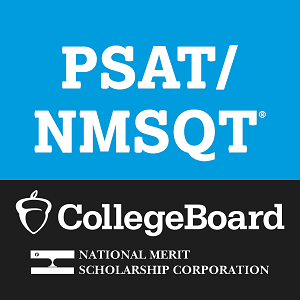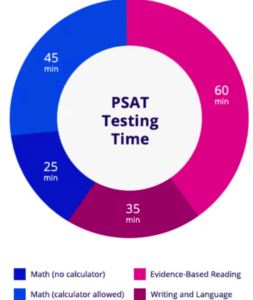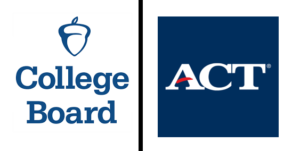About the SAT
The SAT is an entrance exam used by most colleges and universities to make admissions decisions. The SAT is a multiple-choice, pencil-and-paper test created and administered by the College Board.
The purpose of the SAT is to measure a high school student’s readiness for college and provide colleges with one common data point that can be used to compare all applicants. College admissions officers will review standardized test scores alongside your high school GPA, the classes you took in high school, letters of recommendation from teachers or mentors, extracurricular activities, admissions interviews, and personal essays. How important SAT scores are in the college application process varies from school to school.
Overall, the higher you score on the SAT and/or ACT, the more options for attending and paying for college will be available to you.
When should I take the SAT?
Most high school students take the SAT, the ACT, or both during the spring of their junior year or fall of their senior year. It’s important to leave time to re-take the test if you need to raise your score before you apply to college. The SAT exam is offered nationally every year in August, October, November, December, March, May, and June. View all upcoming SAT test dates.
What is on the SAT?
There are two SAT sections:
- Math
- Evidence-Based Reading and Writing
How long is the SAT?
The SAT is 3 hours long.
How is the SAT scored?
Each section of the SAT is scored on a 200 to 800-point scale. Your total SAT score is the sum of your section scores. The highest possible SAT score is 1600.
How do I register for the SAT?
SAT registration deadlines fall approximately five weeks before each test date. Register online on the College Board website. The College Board may require SAT registration by mail under special circumstances.
How can I prep for the SAT?
We can help. We have SAT prep solutions for every student and every budget.
Resource: princetonreview.com
PSAT/NMSQT

The PSAT won’t count towards your college admissions applications, but it is the qualifying test for the National Merit Scholarship. Some of the highest-scoring students may win scholarship money, so while you shouldn’t stress out about the PSAT, you certainly shouldn’t ignore it either. Use the PSAT as practice for the SAT and ACT and an important guidepost on your college admissions journey.
When is the PSAT?
The PSAT is offered nationally every year in October. Ask your school counselor about when your class is scheduled to take the PSAT. View upcoming PSAT test dates.
What does the PSAT test?
The PSAT has two sections: Math and Evidence-Based Reading and Writing.
You’ll encounter passage-based questions—sometimes accompanied by tables, graphs, and charts—and math problems drawing upon algebra, geometry, and a little trig.
HOW LONG IS THE PSAT?
The PSAT is often taken during the school day, in place of other classes. The test itself takes about 3 hours, including break time.
 Resource: princetonreview.com
Resource: princetonreview.com
About the ACT
 The ACT is an entrance exam used by most colleges and universities to make admissions decisions. It is a multiple-choice, pencil-and-paper test administered by ACT, Inc.
The ACT is an entrance exam used by most colleges and universities to make admissions decisions. It is a multiple-choice, pencil-and-paper test administered by ACT, Inc.
The purpose of the ACT test is to measure a high school student’s readiness for college, and provide colleges with one common data point that can be used to compare all applicants. College admissions officers will review standardized test scores alongside your high school GPA, the classes you took in high school, letters of recommendation from teachers or mentors, extracurricular activities, admissions interviews, and personal essays. How important ACT scores are in the college application process varies from school to school.
Overall, the higher you score on the ACT and/or SAT, the more options for attending and paying for college will be available to you.
When should I take the ACT?
Most high school students take the ACT, SAT, or both during the spring of their junior year or fall of their senior year. It’s important to leave time to re-take the test if you need to raise your score before you apply to college. The ACT exam is offered nationally every year in September, October, December, February*, April, June, and July*. View all upcoming ACT test dates.
*No test centers are scheduled in New York for the February or July test dates. No test centers are scheduled in California for the July test date.
What is on the ACT?
There are four ACT sections:
- English
- Reading
- Math
- Science
The ACT also includes an optional 40-minute Writing Test. Some colleges may require that you complete the ACT Writing Test. You can confirm each college’s admissions policies on the school website or on our school profiles.
How long is the ACT?
The ACT is 2 hours and 55 minutes long. If you choose to take the ACT with Essay, the test will be 3 hours and 35 minutes long.
How is the ACT scored?
Each section of the ACT is scored on a 1 to 36-point scale. Your composite ACT score is the average of your four section scores, also on a scale from 1 to 36. If you take the ACT with Writing Test, you will receive a separate score on the Writing Test.
Should I take the ACT or the SAT?
Most colleges and universities will accept scores from either the SAT or ACT and do not favor one test over the other. That said, college-bound students are increasingly taking both the SAT and ACT. Changes made to the SAT in 2016 have made it easier than ever to prep for both tests concurrently—and earn competitive scores on both! The best way to decide if taking the SAT, ACT, or both tests is right for you is to take a timed full-length practice test of each type. Since the content and style of the SAT and ACT are very similar, factors like how you handle time pressure and what types of questions you find most challenging can help you determine which test is a better fit. Try our QUIZ: SAT, ACT, or Both? to learn more
How do I register for the ACT?
Registration deadlines fall approximately five weeks before each ACT test date. You can get registration materials from your school counselor, or you can register online on the ACT website.
Resource: princetonreview.com
What is Advanced Placement and why is it important?

AP tests are only offered during a two-week period in May, so if you’re going to take them, you need to plan ahead.
What specifically do the APs test?
A lot. Similar to the SAT Subject Tests, there are AP tests that cover a range of subjects from Biology to European History to Music Theory. There are currently over 38 AP test options, though few high schools offer classes in every subject. Want to know the full list? We’re glad you asked. See the full list of AP subjects.
How are the APs scored?
AP tests are scored on a scale of 1–5. While every college is different, most schools won’t accept AP scores for credit unless you score at least a 4. Learn more about AP credit.
When are AP tests?
APs are administered every year during a two-week period in May. View the 2020 AP exam schedule.
When do AP scores come out?
AP scores are released each year in early July.
Do AP scores matter?
AP scores won’t affect your high school GPA or your chances of college admission. (The fact that you took AP courses when they were available is a different story!) But good AP scores can earn you college credit. Just remember that every school is different. Some won’t accept credit unless you score a 5. Some won’t accept them at all. Be sure to check with your top schools to understand how they handle AP scores.
How do I register for AP tests?
AP tests are administered by The College Board, which also administers the SAT. However, not all AP tests are offered at every school. If you have an AP Coordinator at your school, talk to them directly about registration. If your school doesn’t have an AP Coordinator, you need to call AP Services no later than March 1 to get the contact information of your closest AP Coordinator. You can find the number for AP services on the College Board website.
TSIA2

If you’re not ready for college-level courses, the tests help determine what types of courses or intervention will best prepare you for college-level work. You take TSIA2 tests on a computer and, depending on school policy, may get your results immediately after you finish the test.
Not all Texas college students have to take TSIA2. If you’ve met college readiness standards on a standardized test like the SAT or successfully completed a high school college preparatory course, you may be exempt. Contact the college you’ll be attending to see if you need to take TSIA2.
Before you take TSIA, you’ll need to complete a preassessment activity. The institution or school district where you test will provide the activity and document your participation.
What Is CLEP?
The CLEP exams (College-Level Examination Program) measure a person’s knowledge of college-level material for more than 30 specific subjects and allow test-takers to earn college credit. These exams can benefit continuing education students, military personnel, and college students.

Exams take between 90 to 120 minutes to complete and each one is $89. The test is free for individuals serving in the military. Military family and civilian employees may also be exempt from fees. Visit collegeboard.org for additional information.
Why Take a CLEP Exam?
Earning college credit by taking a CLEP exam allows you to reduce the amount of time and money spent earning a degree. Over 2,900 universities and colleges accept CLEP credits. Aside from higher education institutions, CLEP exams are also administered at over 1,800 test centers.
What Are the CLEP Subjects?
The College Board offers 34 CLEP exams in several subject areas. You need to check your institution’s CLEP credit policy to determine the exams that are acceptable and how many credits you can get. The table below lists the exams by subject:
| CLEP Subject | Exams |
|---|---|
| History & Social Sciences | American Government History of the U.S. I & II Western Civilization I & II Human Growth and Development Intro to Educational Psychology Introductory Psychology Introductory Sociology Principles of Macroeconomics Principles of Microeconomics Social Sciences and History |
| Composition & Literature | College Composition College Composition Modular American Literature Analyzing and Interpreting Literature English Literature Humanities |
| Science & Math | Biology Chemistry Natural Sciences College Mathematics College Algebra Precalculus Calculus |
| Business | Financial Accounting Information Systems Introductory Business Law Principles of Management Principles of Marketing |
| World Languages | French 1 & 2 German 1 & 2 Spanish Language 1 & 2 Spanish with writing 1 & 2 |
How to Register for a CLEP Exam
You can register for a CLEP exam with the College Board, or you can contact a testing center. The CLEP exams are administered throughout the year across the United States and internationally. When you register on the College Board, you have to create an account and fill in your personal information. The account allows you to search for test locations and dates, and to sign up for score reports. Here’s a checklist of what you need to do:
- Research CLEP credit policy by the institution
- Select a CLEP exam
- Register for a CLEP exam
- Get prepared with practice questions
Resource: study.com
Joing Over 500,000 Students Enjoying Avada Education now
Become Part of Avada University to Further Your Career.



